Safety First: Tremco's Global Safety Initiative - PODCAST TRANSCRIPT
May 10, 2024 at 12:00 p.m.Editor's note: The following is the transcript of a live interview with Tremco’s Executive Director, HS&E Ro Lewis.You can read the interview below or listen to the podcast.
Intro: Welcome to Roofing Road Trips, the podcast that takes you on a thrilling journey across the world of roofing. From fascinating interviews with roofing experts to on-the-road adventures, we'll uncover the stories, innovations and challenges that shape the rooftops over our heads. So fasten your seat belts and join us as we embark on this exciting roofing road trip.
Karen Edwards: Hello, and welcome to this episode of Roofing Road Trips from RoofersCoffeeShop. My name's Karen Edwards and I'm your host today and I'm really excited to be talking about one of the most important topics in the roofing industry and that is safety. And I am thrilled to welcome Ro Lewis from Tremco. Ro is an expert at Tremco and in all things safety. And so we're really glad to have you here today for this important topic. Welcome, Ro.
Ro Lewis: Thank you, Karen. And I got to tell you, I always enjoy my time with RoofersCoffeeShop and just spending time with you guys. I just love your mission and the things that you do, so I appreciate you having me.
Karen Edwards: Thank you. And vice versa, which is, like I said, one of the most important topics in the roofing industry, it's safety and Tremco has just ... People listening to this can't see this, but you're wearing a lead with safety shirt right now for Tremco because that is just part of Tremco's mission. And I'd like you to tell our listeners, just introduce yourself and explain what you do there at Tremco and what your involvement is in the safety initiatives.
Ro Lewis: Sure, sure. Thanks, Karen. So as you mentioned, I'm Ro Lewis. I'm the executive director of the Health Safety and Environmental Team for Tremco CPG Field Services. The field services division comprises nearly 2000 employees globally, comprised of experienced field techs and construction leaders across diversified building solutions offerings. So of course, we're a roofing organization, but we've branched out into other areas. However, the roofing piece of the business just so happens to be the lion's share of the conglomerate. So in all, there are six businesses under the umbrella and the global footprint reaches both Canada and the UK. So as you can imagine, there are numerous assets to protect across the board with the most significant asset for us, at least in our mind being our phenomenal workforce.
So as the head of the safety team, I'm responsible for the overall strategy and implementation of corporate safety initiatives and comprehensive implementation, of course, safety practices and principles, which include by the way, continually building, growing and driving our robust safety culture throughout the business. So, I have to say this, I partner with my amazing safety team of now we've grown to a team of 16 in this effort and they are the most, my God, intelligent, hardest-working group of safety professionals. I know. And we often tell people, when you get one of us, you get all of us. So without these remarkable individuals, the company's thriving safety culture would not be realized.
Karen Edwards: Wow. I know we've talked before in past years and written about the safety culture there, and there was nowhere near 16 people, I think a few years ago. So tell our listeners a little bit about how you got into the role that you're in right now. What's your journey? How did you get involved so passionately in safety?
Ro Lewis: Well, it's sort of a weird journey. I was in school actually to become an electrical engineer and went through the painstaking journey of going through all of my calc courses, calc 1, 2, 3 and then differential equations. And that was all fine. And I finally moved past all of that, the weeding-out phase and did well with it and got into my major classes. And I never forget, I had to take solids and statics and I said, "Oh my God, wait a minute. Stop. I cannot do this the rest of my life. This is not what I thought it was going to be." And so here I am, I passed all of these courses and I have no direction as to where I'm going. So I had a friend in school that says, "Hey, have you ever thought you safety engineering? Have you ever heard of safety engineering?"
I'm like, "No." I didn't even know what OSHA was. Even though I had folks that were around me that were in the construction industry, I still didn't know what this safety deal was. And so, I went and met with the dean of the program at my school, shout out to Grand Valley State University and he said, "You know what, with these courses that you have, I can't believe you're coming to talk to me. So I'm going to let you take the intro to safety course. It's like OSH 100, O-S-H 100. And if you feel that you like it and you want to stick with it, I'll let you stay in the program."
And it just changed my whole way of thinking about accidents and incidents and how things can be prevented and just shaped my mind in a different way and the rest is history. And so then from there, I took an internship with a company called Walbridge right out of Detroit. At the time, it was Walbridge Aldinger. It is Walbridge now and just learned all that I could learn there and just kind of went up the ranks as a safety engineer and the rest is history and end up coming to Tremco and been here about 11 years and just wanted to help to shape what we now experience as a safety culture.
Karen Edwards: Wow. Yeah, so mentioned OSHA in there, and there's a love-hate. I think with OSHA, safety comes first. They're here to help us and protect us. And one thing that OSHA does every year is they have a safety stand-down, which is a week to just kind of create awareness-
Ro Lewis: Sure.
Karen Edwards: And just another opportunity for education. How does Tremco participate in this and why is it important for the industry overall?
Ro Lewis: Well, as you know, and most people know annually, OSHA, along with several partnering organizations, they spearhead a national safety stand-down, which initially was to prevent falls in construction in the construction ... Well, truthfully in all industries, quite honestly and encourage employers to participate by hosting a stand-down to discuss fall protection and safety when working from heights. And this year is going to take place the week of May 6th, the 6th through the 10th and companies can participate however they choose. It's obviously a vital discussion for the roofing industry because the subject is right in our wheelhouse. I mean, every day we're asking employees to work at heights and roof edges and climb all types of ladders and expose themselves to fall hazards on a regular basis.
I mean, just think about how many times a work crew of maybe four that we may send out, how many times they travel up and down a ladder daily. It's absolutely our duty. It's really our primary responsibility to not only discuss falls safety, but to also invest significantly in training our people on how to continually implement the appropriate precautions and safe work measures to prevent falls and injuries. And so that sometimes and oftentimes can become fatal. So it's a hands-down imperative and should be approached seriously in a two-way discussion. You can't just talk at people. They have to be involved in the conversation so that it can just land and make sure that it resonates as a part of their psyche. So I think it's vitally important.
Karen Edwards: Yeah, that's a two-way conversation is so important because if you're talking at somebody, it's probably not going to sit. It's just going to go in one and out the other and engaging them and being involved is so important. So, how does Tremco, you call it a global safety stand-down. What does Tremco do not only during this week but year-round?
Ro Lewis: Well, it is funny that you framed it in that vernacular. You started off talking about our mantra, our foundational safety mantra is lead with safety and overall, especially in the roofing industry, that's a pretty bold statement, and it's really a lofty ideal to subscribe to when considering all aspects of our business. We're so multi-dimensioned. So the safety department felt that though we fully support OSHA's effort and we absolutely will participate in May for the stand-down, but we thought that the stand-down simply wasn't enough to fully express the importance that we place on being a safe company and providing a safe work environment for our team members. So last year we introduced a new safety initiative to the organization, and that was the inaugural Tremco Field Services Global Safety Week, where our safety week is an annual event. So it's almost part two of the stand-down that we have in May.
But the annual event aimed at providing our people an opportunity to focus on our comprehensive safety culture and examine and actually celebrate our employees' daily safety performance, which impacts them, it impacts their families, it impacts our organization and the communities in which we work. So it also fortifies our resolve to kind of remain united in our commitment. I mean, we're really committed to this thing. And to see the growth that's been involved with all of the cultural practices and the workplace environments that we create, it's just been phenomenal. So it's a celebratory week across the board that now serves as, like I said, part two of our official participation with the standout efforts, but we're doing it our own way.
Karen Edwards: Okay. So talk to me a little bit about successful outcomes, impactful stories. You've been there 11 years, your team has grown and grown. What are some anecdotes maybe that you could share, how it's made a difference?
Ro Lewis: There's both short-term and long-term outcomes that have been pretty impactful. I think looking back over the years, the journey in itself has been the best anecdote I think I could provide because seeing the aha moments of our people, and that's our people at every level. I'm talking about from the corporate C-suite level, all the way down to the first-day tech who we've grown to a point where ... And this is not a pat on the back, it's just the reality of it that we've grown to a point where folks come in and they work for us for about six months and says, oh my God, I've never worked for a roofing company that talks about safety this much or demands or mandates this much from us. And when we say mandate is not a stick and a carrot type deal where we're just kind of always barking or Bible-thumping as you will, they see that we genuinely care about their well-being.
And so even with the safety week, they come together and they converge all in Canada, in the UK, wherever we have a business unit or a region that falls under the field services umbrella, that team and that region comes together centrally. Sometimes our regions are so large that they have to split it up and they will make it a 2, 3, 4-day event, but make sure that everyone is actually involved and when they see the level of investment that we place into them to celebrate them, and I mean there's food trucks, there's vendors coming from everywhere. And this year we want to make it even greater. They see that we really, really care about their wellbeing and I think that is all I need, that they fully understand that safety is vital, understand the gravity of it and understand that we want them to go back home. The full mantra that we added onto is not only lead with safety, but so that you can end with family. And we put it in that perspective so they can see it through that lens.
Karen Edwards: So how have you seen the safety initiative at Tremco evolve in your time there and where do you see it going? How do you sustain it?
Ro Lewis: Yeah, sustainability is something. Like I said, I've been here 11 years and I've watched the progression of the safety culture here permeating into the fabric of our corporate structure. It's one thing to just talk about it. Oh, that only relates to them out in the field. Give them a hard hat, give them some gloves. That's not where we are. It's really permeated into the fabric. And so it's permeated into our go-to-market strategy and are embracing it as really the cornerstone of our business. And that's not hyperbole it a real palpable thing. And safety is more prevalent in the organization now than it's ever been. And that's not to say that we've arrived. We still have a long way to go, and we have many new initiatives on the horizon. But I would tell you Karen, if you took a survey of a microcosm of our folks and just ask them to tell you about our safety culture and that would be from our most senior leader in the organization down to the tech in their first year, they would be able to do so probably ag nauseum without a second thought.
And I think it's largely because we place such a great emphasis on being safe, not just impacting them, but the result of it impacting their families, how it impacts our business so that they can continue to thrive our communities and our clients. And they get that their individual success or safety success builds the success of the whole. And they, for the most part feel sort of beholden to that. And so that's how I think it's really kind of morphed. When you ask where is it going, I think the participatory aspect of it where folks are literally wanting and asking, what can I do? What can I do more? How can I be involved more? That has been a just wonderful thing to see and to watch, because we recently just started our health and safety committee in the organization, which you don't really see in a whole lot of construction organizations. You may see it in the manufacturing environment, but not really in a lot of construction.
And I mean, you should just see, it was difficult pairing down the pool of folks that applied to be a part of the safety committee down to just 13 people. And you think 13? Yeah. I mean, there were, I think over 200 folks that literally jumped in and says, Hey, I want to do this. And there were folks from ... There were director-level, there were tech-level, there were supervisory-level all across all of our business units. So that's just one example. I could go on and on, but that's just one example.
Karen Edwards: Right. Yeah. I know I've talked to many of the team over the years and they all have talked about the safety. Just being outstanding, unsurpassed, not only do you equip them with the right gear and tools and shoes and everything, but the entire culture. In talking about if someone's listening to this right now and they really want to, yeah, they have a toolbox talk once a week or whatever and they talk ... how do you really get that safety ingrained? Where does that start and what are some of the challenges that maybe you even had to overcome in your journey to get where you are today?
Ro Lewis: Yeah, I think the misnomer about safety, Karen, is that it's a policing activity. You do what I say, do you do it now. And oh, by the way, it's free or good. And so many safety programs take that approach. And quite honestly, in the beginning of really building this thing out, we sort of had that approach where it's just always a stick. And we had to move away from that and learn that we're talking to people, right? We're not talking to kids, we're talking to professional adults that have feelings, that have thoughts, that have opinions about better ways to do it. And oh, by the way, they're the ones actually doing the work. They're the boots on the ground that have tool in hand. And so we just figured we had to listen to them. And what we learned is that yes, they understood safety was important. Nope, we don't believe that anybody comes to work, just says, Hey, I'm just going to go and break a leg today, or I'm just going to go and be obstinate. We don't believe that.
But we do believe that production pressures and getting things done can sometimes be the antithesis of them actually operating in a safe manner. And so we had to find that balance there, right? And what we did was said, okay, we understand where you're coming from, so we're going to empower you, right? Some folks feel intimidated when they see something wrong. I can't tell my boss that I'm not supposed to be doing this or we were trained the wrong way. So our biggest campaign concern in safety now initiative is our stop work authority program where we have empowered anyone in the organization. And when I say anyone, I mean anyone, no matter his or her position, title, seniority, they have the right ... And actually the duty to apply stop work authority if in their judgment an activity is felt to be unsafe or risky.
And what we've exercised is no one exercising that stop work authority in good faith will be blamed or disciplined even if upon investigation the stop work was deemed unnecessary. We've found a way to empower our people to speak up. And what we've learned is eight to nine times out of 10, when they do that, they've prevented something that could have been gravely injurious or that could have even been remotely harmful to any of the people on their teams out in the field. That has been pivotal for us.
Karen Edwards: Wow. Yeah, because I can imagine, especially maybe you haven't been there that long or you're entry level and it could be hard to speak up and say something to your supervisor or to the foreman on that job. And I personally would be afraid to do that. So I think it's really important to send that message across. And maybe if I experienced it, then I might feel a little more comfortable doing that on my own. But how hard is that? I mean, I don't want to say how often does it happen? Because we don't want to say there's a lot of things, but are you seeing that people feel able to speak up in the courage question.
Ro Lewis: It takes courage. It takes courage. And at first, I got to tell you that when we started the initiative or introduced the initiative a few years ago, there was not much traction because of the very thing you just said. And the one thing that, if I could say this to any other organization and many organizations that have a successful safety culture already know this, if you do not have top-down leadership support, you don't have a functional safety program. The C-suite levels of the organizations have to be fully bought into embrace and actually understand the reasoning behind the necessity for safety. And that's one thing that I'm grateful that we enjoy here in this organization because to combat that kind of uneasiness, we've had everyone from our group president, Paul Hoogenboom to our president at the time, JK Milliken, now our president, [inaudible 00:21:04], our executive vice president, Mardee Billingsley, they literally get on video in discussions, in meetings and articulate the fact that they have endowed them with stop work authority.
That's different than a safety guy coming and saying, Hey, you can stop this. No, when the executive vice president or the president of this organization says, Hey, you, first-day tech, you can tell me that I need to put my hard hat on when I come to this job and I don't have it on, that broke the tension a bit and it empowered the folks to know that, no, these folks really mean this. And our stock work authority's reports and submittals has increased over 300% over the last two years.
Karen Edwards: Wow.
Ro Lewis: And that's not saying it went from one to 300. I mean, literally, it's been exponential with the understanding that they really can help to make things better on the site, and it gives them buy-in quite honestly.
Karen Edwards: Yeah. So most of what we've been talking about has been on a job site or in the field, but kind of the same culture exists in the office. You think, well, how's somebody going to get hurt in the office? Well, they could trip over a cord running across a walkway.
Ro Lewis: Sure.
Karen Edwards: What does that look like inside your offices? The safety culture.
Ro Lewis: It's a little bit different post-COVID. If you go to our Beachwood headquarters, I remember when I first came to the organization, I actually had to move to Cleveland and resided an office there and it was just bustling. I mean, people everywhere, voices everywhere down in the cafe, you're seeing people.
And then post-COVID, you don't see as many people. So we have a lot of folks working remotely, but that does not lessen the messaging of the importance of safety even from home, right? And I start the statement in that manner because I just recently made an appeal to the entire organization to come back to the basics. We have signs in every one of our meeting rooms in our headquarters that says, Hey, are you leading a meeting? Lead the meeting with safety. Meaning when you first start this meeting off, your first conversation point is something regarding safety. And because we're even in the way that we're doing this podcast, now you're in your location, I'm in my home, but I don't care if your husband or your wife is out doing something in the yard, talk about a safety moment with them. Talk about anything that's pertaining to safety that's in your world. It does not matter.
And what that does is it gives you the mindset that safety is always foremost. And it's not safety first. Safety first. No. It means that we are leaders, we're leading the industry and the only way to do that is to lead it with safety. And so we've come back to that understanding to be able to say, if you're in the office, if you're at home in a remote office, this is still going to be our focus.
Karen Edwards: Yeah, yeah. And you just had me thinking there like, oh, yeah, put your sunscreen on because you're going to go, put your hat on, wear your safety glasses, right?
Ro Lewis: Absolutely. Well, I had a person not too long ago, one of the employees that had this exact same question. "I saw your video, Ro. I really want to engage." I believe she was an administrator for one of our regions. I want to do this, but how do I do this? I work from home. And I gave her the easy example. It does not matter. I said, "If you have young ones in your home and you need a fire escape plan, talk about how you went through the fire escape regimen with your daughter or your child or whomever, with your family." That's a safety moment. But the overarching theme is to ensure that you keep it top of top.
Karen Edwards: Yeah. Wow. I love it. I love that. And it makes me want to do it. You're very inspirational, and I'm going to think about that next time I'm leading a meeting for sure. So if a roofing companies really want to participate more, if they want to have their own stand-down, if they want to really embrace this culture, do you have tips for success? How do they get started doing more?
Ro Lewis: Yeah, I think I alluded to it in our conversation. The first thing I think that we would need to do or the company would need to do is have the serious conversation with their leadership, their very senior, most senior leadership and say, look, this is the vision. Safety is an investment. It's an investment in the company. It's an investment and get work opportunities, business development. You have to be compelling in that regard for them to fully understand it in the language that they speak, but also from the perspective of, oh, by the way, we're protecting our greatest asset in the organization. Once you've had those conversations and you sort of create that crack in the door and you get your foot in there, then you have to go to your boots-on-the-ground leaders, your mid-level leaders, which is where really the most responsibility reside.
If you are a safety manager or director that you don't have a large safety team, and it's really on you to drive that culture, you need help. And your biggest help is going to have to come from your mid-level leaders. So you really have to create an embrace of your message, of your goals for the people and for the organization as it relates safety with them, have it resonate and have them to undergird you in those efforts.
And then lastly, of course, you have to appeal to those that are actually doing the work and say, Hey, look, this is the new way that we need to approach this and help them to understand all of the things we talked about in the conversation. It's a tiered level. And then first thing, you really have to be committed to it if you're leading this.
Karen Edwards: Sure. Wow, wow. This was such a great conversation. It's so impressive, the safety culture that you have helped to create at Tremco, and that everyone embraces there. And I really hope that someone listening today took away a few nuggets that they can start maybe creating that same culture in their business and in their company.
Ro, thank you so much for being here. It's always a pleasure to talk to you and to folks at Tremco to hear what's going on out there.
Ro Lewis: Thanks, Karen. Thank you so much. And once again, I appreciate you having me.
Karen Edwards: Yeah. And thank you everybody for listening. Be sure to follow us on social media. You can listen to other episodes of Roofing Road Trips, wherever you listen to your podcasts. We're on every platform out there. And follow along so you don't miss a thing. And we will see you next time. Thanks, everyone.
Outro: If you've enjoyed the ride, don't forget to hit that subscribe button and join us on every roofing adventure. Make sure to visit rooferscoffeeshop.com to learn more. Thanks for tuning in, and we'll catch you on the next Roofing Road Trip.
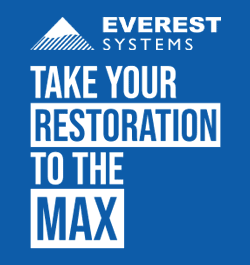




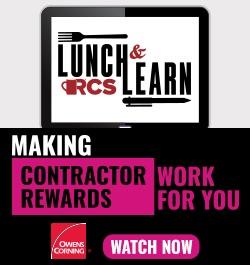







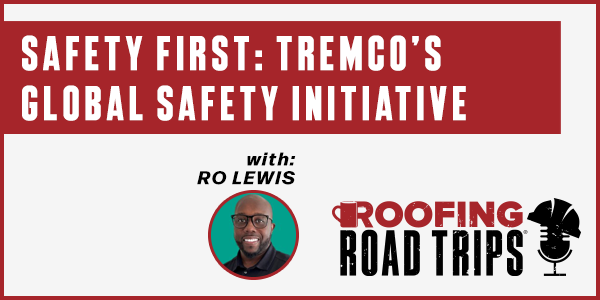
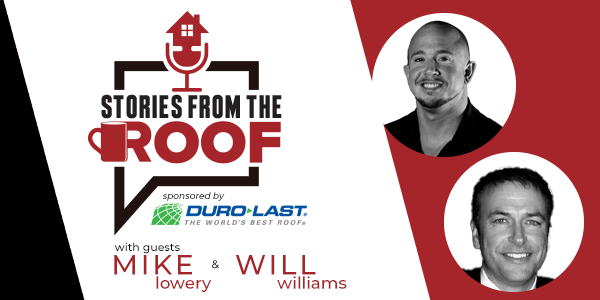
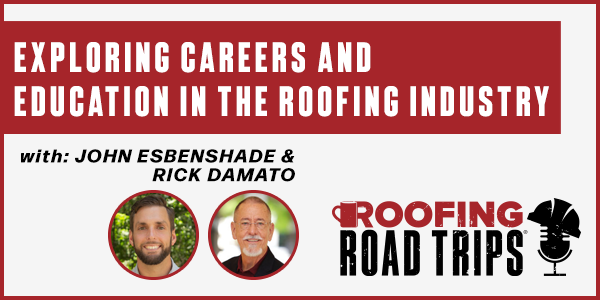
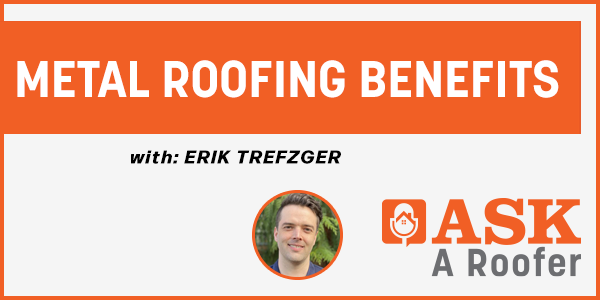

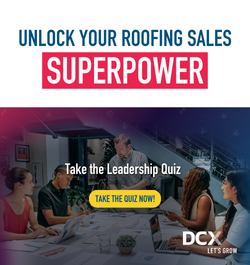
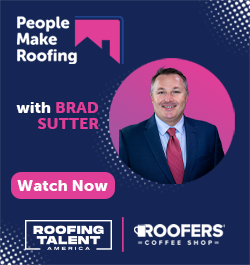

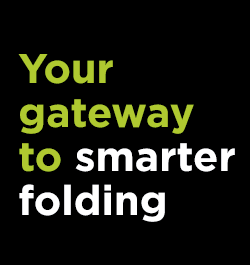
Comments
Leave a Reply
Have an account? Login to leave a comment!
Sign In